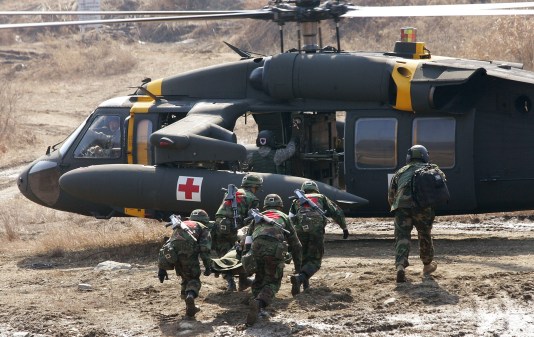Army’s new brain health strategy to address anomalous health incidents, Havana Syndrome

The Army’s in-development “comprehensive brain health strategy” will include elements that address anomalous health incidents and symptoms — such as those associated with the mysterious Havana Syndrome — that are harming military personnel.
Senior defense officials provided new information about those plans and the overarching vision behind that new strategy during a media roundtable with a small group of reporters at the annual AUSA conference on Tuesday.
“One of the things that we’re paying close attention to is this changing character of warfare and how we as a force need to be prepared,” Col. Matthew Scherer, director of Medical Research Development Command, told DefenseScoop during the briefing.
This new strategy is being produced as part of the Defense Department’s broader Warfighter Brain Health Initiative, which leadership originally launched in 2022 to pave the way for a more unified approach to help military personnel better optimize their health and counter traumatic brain injuries.
Army officials involved in the making of this new guidance anticipate that it will be ready for release in spring 2025, according to Col. Jama VanHorne-Sealy, who leads the Occupational Health Directorate.
“We’re looking at every aspect of brain health — all the way from, are you eating all the necessary fruits and vegetables; are you getting your exercise; are you getting enough sleep, so we prepare the brain to optimize — to, is your job tempo requiring you to work at a deficit; are you working 12 hours a day and six days a week, and that’s causing a cognitive change in order to identify that? [We’re looking] into protective measures that we can integrate and identify within the service to be able to mitigate risks and hazards and potential exposures — to looking to monitoring those individuals and documenting in their medical records,” VanHorne-Sealy explained.
“And then also, as you heard on the other end of the spectrum, we’re optimizing treatment, determining what research gaps are still under-addressed. So, as we look to the warfighters’ brain health, we’re looking at it from a total perspective,” she said.
At the roundtable, DefenseScoop asked whether any Army personnel have reported anomalous health incidents associated with Havana Syndrome.
First reported by government officials based in Cuba and elsewhere abroad in 2016, Havana Syndrome refers to a yet-to-be explained medical condition that causes symptoms including dizziness, headaches, nausea, vertigo, memory and hearing loss, vision problems, anxiety, cognitive difficulties, and fatigue — painfully impacting their capacities to serve.
In response to the question, VanHorne-Sealy said she could not provide the number of Army officials that “have and have not” been affected by Havana Syndrome to date, but she confirmed the service is “exploring” the topic.
“[Anomalous health incidents or AHI] is certainly one of the things that we’re calling out in” the in-the-works strategy, she said.
“It’s distinctly possible that there isn’t a lot of underlying science that we’re going to identify quickly. But we want to capture it now. We want it to be part of our comprehensive brain health strategy,” VanHorne-Sealy explained.
Scherer added that the Army is “certainly open to collaborating with academia and other partners” to better understand Havana Syndrome exposure and impacts.
“This is a good example of how things don’t just happen in a vacuum,” he said.
Officials also reflected on how the “changing character of warfare” they’re observing amid the Russia-Ukraine War and other emerging conflicts is informing their prioritization of brain health-supporting pursuits.
“I read a statistic that said that neurosurgical services in Ukraine are doing like 3.2 craniotomies per day — and we just do not have sufficient numbers of providers in the force structure to actually do that work. So, it’s critical for us to make sure we’re leaning forward and preparing the broadest number of our providers to be prepared to take care of those types of threats,” Scherer said.
Sgt. Maj. Chris McNamara, a human weapon system expert with Army Special Operations Command, also noted that Army leaders are now placing “a heavy emphasis” on deploying drones and other advanced weapon technologies to reduce troops’ potential exposure to TBI.
“Things that used to be engineer tasks, things that used to be [explosive ordnance disposal] tasks — no longer have to be a soldier doing that. So it’s actually helping us on the other end of the spectrum. We’re using technology and robotics to achieve things that most people only think of in terms of kinetic effects. Right now, we are doing things with them that are everyday soldier tasks that used to put soldiers in harm’s way,” McNamara told DefenseScoop.




